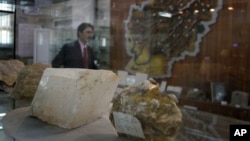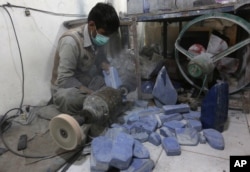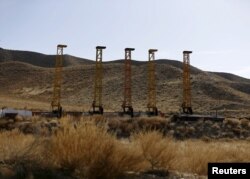The smuggling of Afghan minerals supplies millions of dollars to armed groups, insurgents and strongmen in the country, an Afghan anti-corruption watchdog reported Wednesday.
The Afghanistan Anti-Corruption Network said in a report that militant groups last year received at least $46 million from minerals and precious stones illegally exported from eastern Nangarhar province to neighboring Pakistan.
The report said up to 750,000 tons of marble and talc stones were smuggled in 2016 from various parts of the restive province, where Taliban and Islamic State fighters have been active in several districts.
"Every day, 500 trucks carrying white stones pass through government-controlled roads and arrive in Pakistan from where the stones are shipped to European countries," Zaman Khan Amarkhail, president of the anti-corruption network, told Radio Liberty's Afghanistan service. "Each truck carries around 45 tons of stone."
Talc, one of the most in-demand minerals, is used in the manufacturing of various products including cosmetics, plastics, ceramics and paints.
Afghanistan has some of the world's richest mineral resources, including extensive deposits of world-class copper, iron, gemstones and precious metals.
Surveillance of mines 'weak'
Insurgent groups and local strongmen have taken over mining operations in many areas and put a levy on minerals smuggled out of the country, watchdog groups say.
"Unregistered and illegal artisanal and small-scale mining operations continue to be a source of civil strife, unrealized government revenues, and lost economic output," the U.S. Special Inspector General for the Reconstruction of Afghanistan (SIGAR) said last year in a report.
"The unregulated and illegal excavation and trafficking of precious stones and other minerals has played a role in the fundraising strategies for militant groups and organized crime syndicates," the SIGAR report said.
The Afghan government says fighting between Afghan forces and militant groups has led to an increase in illegal mining.
"Due to the conflict and insecurity, we have not been able to properly protect the mines, and illegal extraction of mines and smuggling continue," said Ghizal Habibyar, Acting Minister of Mines and Petroleum.
Analysts say the mineral-smuggling occurs through a strong network of militants, local mafia, and some civil and military officials in the country.
"A triangle of Taliban militants, including some Central Asian fighters that are linked with al-Qaida, local strongmen, and corrupt government officials are involved in this illegal business," Haroon Rashid Sherzad, a Kabul-based civil society activist and former deputy minister of anti-narcotics, told VOA.
"It is a huge business for the involved parties who are thriving under a weak government surveillance," Sherzad said.
The Afghan mines ministry says the government has banned the exports of minerals to Pakistan and encouraged local businesses to invest in the sector and legally export processed material to foreign countries.
"But the ongoing insurgency and instability in the province has not allowed businesses to establish factories," an official of the ministry of mines told VOA, on condition of anonymity.
Border corruption
Pakistan and Afghanistan have no official agreement on the export of minerals to Pakistan.
An ever-increasing demand by the Pakistani industrial sector continues to draw raw material from Afghanistan, including chromite, lapis lazuli, coal, and marble.
Experts say border corruption is costing Afghanistan millions of dollars. Although customs revenue collections have increased during the past year, according to the country's finance ministry, rampant corruption at border crossings means the government loses an untold amount in revenues.
"Surveillance is weak at the borders. An individual with a license to export 100 tons of stones would be able to export 1,000 tons instead," Sherzad said. "Corrupt officials turn a blind eye to illegal exports and, in return, they too benefit from it."
According to the anti-corruption network, precious stones are being illegally extracted from at least 2,000 mines in northeastern Badakhshan province.
"Last year, $300 million worth of precious stones were smuggled from the province to China," said Zabiullah Wardak, a member of the watchdog group. The remote Badakhshan province is connected to China through the narrow Wahkhan Corridor.
The Taliban and Islamic State have imposed several illegal levies in areas they control.
"They are receiving money by imposing various taxes, from Ushar [an Islamic tax on agricultural products] to municipality and transportation taxes," Sherzad said. He added that many Taliban commanders are running illegal businesses besides directing fighting against government forces.






